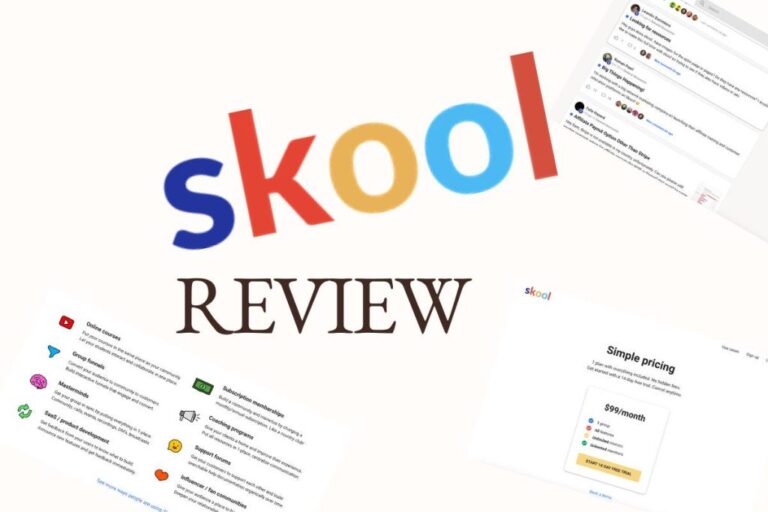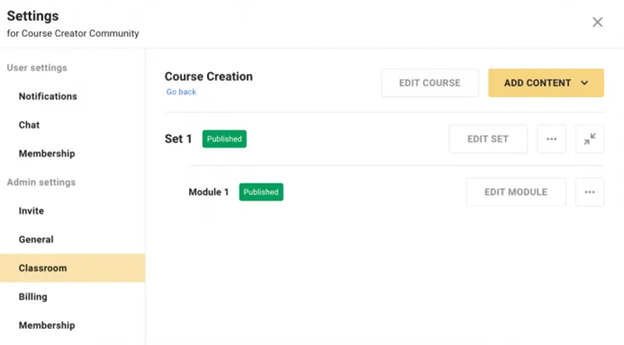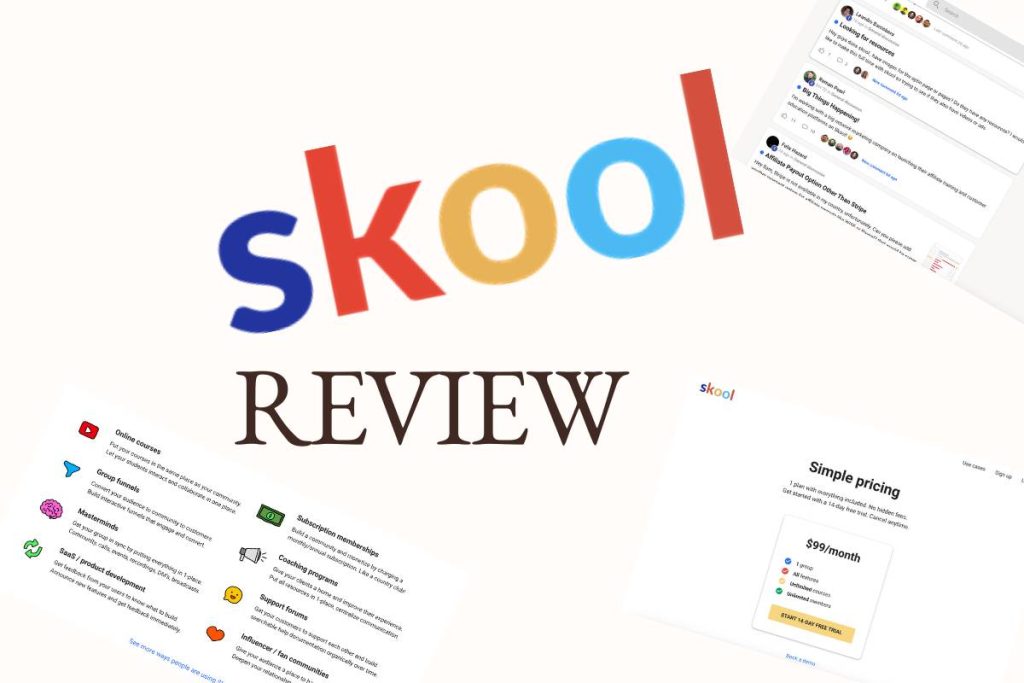Skool Review 2025: Is This Platform Worthwhile for Course Creators?

Skool is an innovative online platform designed for creating and managing engaging learning communities, offering tools for course creation, community building, and interactive discussions, all within a user-friendly and collaborative environment. It’s tailored for educators and creators seeking to foster a vibrant, interactive learning experience for their students.
But does it have all that you need as a content creator to seamlessly grow your business? In other words, is it worthwhile for course creators like you?
After hearing all the hype about it, I had to test it out myself. See all of my thoughts in this in-depth Skool review.
What is Skool?
Skool is a community platform started by serial entrepreneur Sam Owens in 2019. It is designed to keep everything in one place, so you can better manage your offerings.
With Skool, you can do the following:
- Host online course content.
- Create membership sites and manage your subscriptions and members.
- Create funnels.
- Set up communities.
- Create specialized premium content for an additional fee.
- Offer group and personalized coaching programs.
- Gather feedback from users.
As you can see, it’s a one-stop place for all your content and provides multiple ways to interact with your customers and make money. This is not a surprise given that this tool was created to fill the gaps that exist in many of the other platforms.
That said, is it ideal for you?
Let’s explore each of its features to help you make an informed decision.
Online Course Creation
Creating your courses and uploading your content is simple and intuitive on Skool. All you have to do is navigate to the Classroom feature, give a name to your course, and start adding static content. It’s one of the easiest systems I’ve used.
I found that the user interface is very straightforward and self-explanatory.

You can create different sets and modules to make your content more meaningful and understandable for your audiences. Every module can take links, files, and a description of what to expect from it. You can even include action items and transcripts in it.
Once your students take the course, you can monitor the completion rate of each module to better understand what types of media are most preferred by your students.
However, it’s important to note that Skool does not support native video hosting. You’ll need to upload your videos to platforms like YouTube or Vimeo and then link them within your module. This is a bit of a drawback, but not a deal breaker.
Also, you can’t change the look and feel too much and all courses will have the same layout and design. The good news though is that the design is modern and attractive.
Another aspect to note is that you can’t add quizzes and assessments directly to your course. You may have to rely on third-party integrations if you want to include this in your course.
Community
Community is one of the central features of Skool, and in my opinion, this is where the platform really shines. The interface resembles Facebook, allowing members to view their feeds and stay updated on community activities
As a content creator and admin of a community, you have complete control over the group posts and events. You can even choose to make the posts admin-only, so only you can post and others can merely interact with your posts.
The posts can be text, GIFs, videos, polls, and more depending on your audience’s preferences.
This community feature is helpful for users too, as they can categorize posts, and focus on the topics that interest them. Such personalization can bring more people to this site, which in turn, can increase your community and revenue prospects as well.
Gamification
Another highlight of Skool is the gamification option.
When many users interact with the content you post, you earn a certain number of points. In this sense, you get incentivized for your efforts with points. As you earn more points, you move on to higher levels, and this is displayed on your profile.
From a monetization standpoint, these levels add credibility to your offerings, and more users are likely to trust those who are at the higher levels. You can also invite specific users to your community through the internal messaging system.
From another angle, you can reward the members who have the highest points as it signifies their high level of interactions within your community. Such incentivization can motivate more people to stay engaged within your community.
All these options together make this platform exciting and can enthuse more people to regularly post and interact.
Calendar
One of the pain points as a content creator is the task of regularly reminding people of your upcoming events. At the same time, these reminders are also important given that people may forget.
For this, Skool has a convenient feature called Calendar.
When members sign up for an event or even a personalized coaching session, the calendar feature automatically converts to their local timezone and reminds them.
Additionally, this feature also displays a personal calendar for you and reminds you of upcoming events, similar to a Google Calendar app.
Funnels
Skool offers a different kind of funnel that can be rewarding for content creators like you. The typical way we go about it as course creators is to send a prospect to a landing page, and then guide them to purchase your product and service through the web page, so they eventually become your customer.
Skool is more straightforward, and honestly, I like it. Instead of a landing page, you send your prospects directly to your community. Additionally, you can offer online courses or share group events through the community to make it a rewarding experience for your customers.
In a way, Skool removes the need for landing pages and makes your funnels more efficient. You can visualize it as a Facebook community but with a higher engagement rate and customization options.
Besides acting as a reminder for those who have signed up for group events, it also displays your events and schedules, so you can stay on top of them as well.
Additional Features
Besides the above main features, there are some other aspects I have to point out that make Skool highly useful for both you and your audience. Here’s a brief look at each of them.
Mobile App
A mobile app is something that most content creation platforms offer today, and Skool follows the pack. But, the difference is that it is well-developed and is as intuitive as using the desktop. Your community members can use this app to send direct messages to other members, view courses, attend events, participate in group discussions, create and interact with posts, and more.
However, this is not a branded app, which means, your followers will have to download the Skool app and find the communities that they are a part of.
Search
You can search through posts, courses, discussions, and comments to find all the relevant content. You can also use regular expressions, wildcards, and more to precisely find what you want.
Integrations
When compared to other content creation tools, the integrations at Skool are a bit limited in my opinion. It integrates with Zapier through which you can connect to other apps. But you’ll have to pay an additional fee to Zapier.
Besides Zapier, you can use WordPress plugins to directly integrate with your blog or website.
Live Messaging
Skool offers live messaging and this can be a huge addition for content creators. Do you know that 79% of businesses offering live chat have seen an increase in sales and customer loyalty? Also, real-time chat increases conversions by 12%.
With Skool’s real-time chats, you too can gain these benefits. Moreover, you can discuss your offerings with a prospect or a community member, answer any queries and concerns, share insights, collaborate, get feedback, and more.
Single Dashboard
Another excellent aspect is a simplified dashboard where you can see all the metrics that matter, including numbers for growth, engagement, and progress. You can view these numbers at the member or group level.
The dashboard is intuitive and it’s easy to find what you want. You can even view progress in the form of graphs to quickly understand the progress you’re making over time.
Complete Control
With Skool, you have complete control over how you want to handle your notifications, chats, and preferences. For example, you can choose to have email digests mailed once a day to get a comprehensive idea of all the popular posts that were published. Similarly, you can choose to get notifications via your app or email.
Email Broadcasts
You can use Skool to send email broadcasts to all your contacts with a single click. All that you have to do is create a post and send it to all the members of your community. While there are no features like tagging or segmentation, the simplicity of sending the broadcast emails appeals to some creators.
Automatic Affiliates
This is an interesting feature in Skool. If any member in your community decides to create his or her own community, Skool will pay you 40% of their monthly subscription. The advantage of this option is that you can make Skool a revenue stream instead of an expense. In other words, you can create a thriving community, encourage many people to create Skool communities and earn a steady income for yourself.
Customer Support
Lastly, the customer support is excellent. Though there’s no live chat option, the email support is prompt. Moreover, there’s a well-developed knowledge base that has answers to most questions. Lastly, the thriving community at Skool provides valuable insights and peer support.
Overall, these features add value to your offerings. It supports your business and helps you interact with more people to eventually make them your loyal customers. The best part is that all this happens through a clean user interface, making it an enjoyable process for you.
Due to these reasons, Skool has quickly become a popular option to interact with your followers, share more meaningful content, and increase your growth and profitability.
Downsides
While Skool offers numerous advantages, it’s important to note that it doesn’t encompass every aspect of an online content business. Notably, it lacks built-in email marketing functionality
Primarily, it’s not a standalone tool for course creation, membership sites, and funnels. Rather, what makes this unique is its ability to combine all of these modules through a community feature that can be rewarding for you and your audiences.
Pricing
Skool charges a flat rate of $99 per month per group. If you manage multiple groups, each incurs a separate $99 monthly fee. But the good part is there’s no limit on the number of members and the courses they can access.
Skool offers a 14-day free trial. You can use this period to evaluate if this tool is a good fit for your needs.
Overall Verdict - Is Skool For You?
At first glance, it may seem like Skool doesn’t have all the features needed for a comprehensive course creation tool as it doesn’t support native video uploads, no email marketing, and no support for quizzes and assessments.
But remember, Skool isn’t just a course creation tool, rather it is a single place to house all your online content, where you can have courses, membership sites, coaching sessions, and stay on top of it all with a vibrant community. With a good strategy, your community members will become your brand ambassadors.
Due to this integrated nature, I think Skool is worthwhile if you want to:
- Create multiple content monetization streams.
- Have a centralized place to store all your online content
- Understand your customers’ preferences better.
- Build a vibrant community for your offerings.
- Send automatic reminders to your members for group events and other programs.
- Incentivize engagement through gamification.
- Chat with members
- Offer one-on-one coaching sessions.
- Monitor the health of your offerings through a single dashboard.
Overall, Skool is a good place for content creators who want everything in one place and place audience interaction and engagement as the central aspect of their content business.
Have any questions about this Skool review? Let me know by leaving a comment below.
This post may contain affiliate links and we may earn commissions. Learn more in our disclosure.



